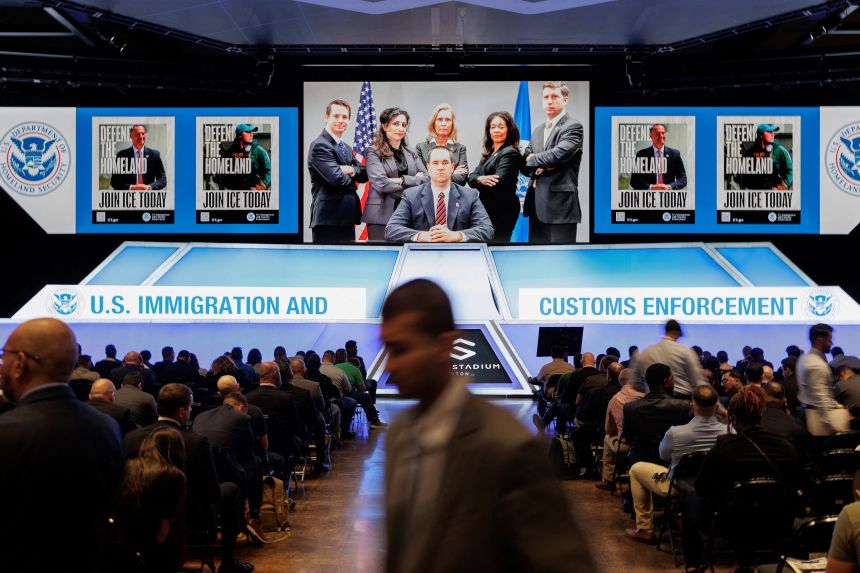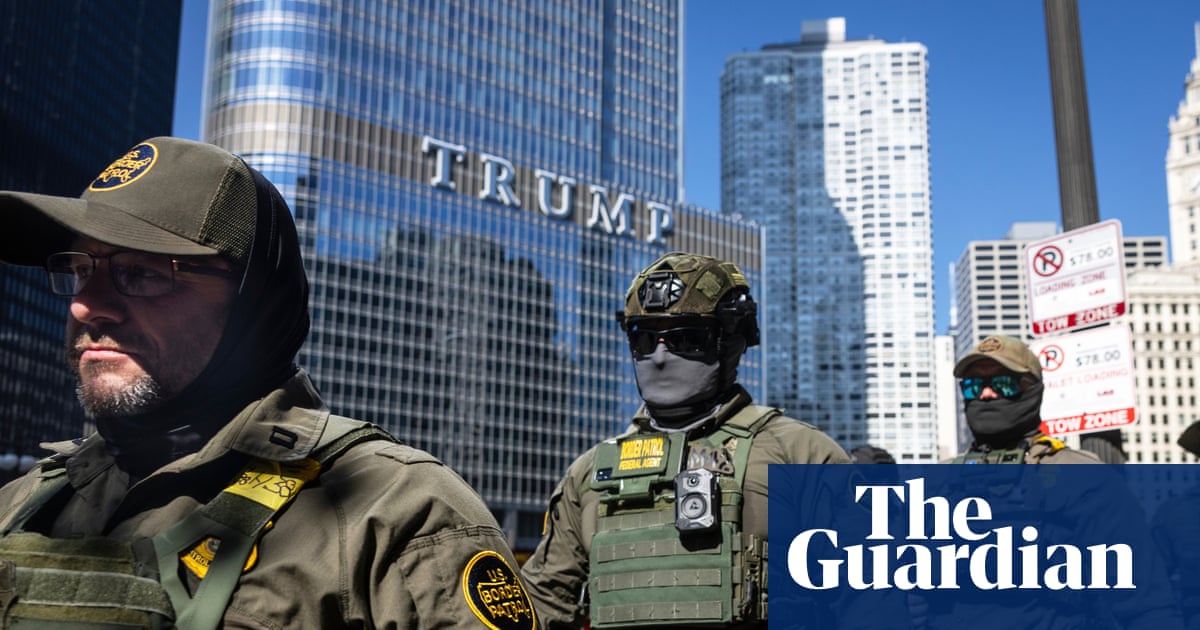When the Trump administration secured billions in funding for the Department of Homeland Security, officials immediately kicked off an aggressive push to hire thousands more deportation officers. It came with a hefty financial incentive: up to a $50,000 signing bonus.
But the effort has hit roadblocks every step of the way.
Multiple sources tell CNN that behind the scenes, ICE was ill-prepared to onboard a surge of agents in a matter of months, resulting in cut corners and people slipping through the cracks, including an informant for the Drug Enforcement Administration who had to be plucked out of the pool of candidates after the agency flagged them to ICE.
“It’s a shit show,” an administration official familiar with the efforts told CNN.
The ongoing recruitment efforts were the source of tension in a multi-agency meeting this week with White House deputy chief of staff Stephen Miller, the driving force behind President Donald Trump’s deportation agenda. Miller expressed frustration with senior ICE officials over the slow pace at which new recruits are hitting the streets to make immigration arrests, according to the administration official.
The signing bonus also prompted discussions internally because it’s not contingent on a key part of the hiring process, which is passing the academy, another source said. Even candidates who don’t pass the academy and are slotted for administrative jobs are still pocketing thousands of dollars.
Current and former ICE officials have argued that the agency — housed under DHS — has historically been strapped for resources and personnel. When Trump signed his sweeping agenda bill into law, it set up ICE to be the most well-funded police force in the federal government over the next four years. ICE alone is set to receive nearly $75 billion through 2029.
When the hiring push first got underway this year, local law enforcement, military veterans, and retired ICE employees received emails from the administration, urging them to join the ranks of the federal agency charged with Trump’s deportation agenda. Homeland Security Secretary Kristi Noem took to the airwaves. And the department flooded social media with callouts for so-called “Homeland Defenders,” and medieval images, painting officers as knights.
By January, the agency aims to bring on board 10,000 deportation officers, according to DHS. The speedy hiring push has resulted in minimal background checks, absent or confusing instructions for new hires, and physically unfit people showing up to the academy, sources told CNN. In some cases, human resources was not effectively communicating what field office new hires had to report to or how much they would be paid.
Within ICE and even up to the White House, “HR is not equipped to hire en masse. … No one has support staff to support this,” one former senior ICE official told CNN.
The Federal Emergency Management Agency has assigned some of its staff to assist ICE HR staffing operations amid the influx of applications, which DHS says is upwards of 175,000 applicants.
In a statement, DHS spokeswoman Tricia McLaughlin dismissed the idea that the department was struggling in its recruitment efforts and said the agency is maintaining its “high fitness and training standards.”
“CNN is cherry picking individual cases out of the more than 175,000 applications of individuals who applied to join ICE law enforcement to help us remove murderers, rapists, gang members, pedophiles, and terrorists from our country,” she said. “The fact of the matter is the vast majority of new officers — more than 85% — brought on during the hiring surge are experienced law enforcement officers who have already successfully completed a law enforcement academy.”
CNN has also reached out to the White House for comment
To become an ICE officer, there are multiple steps involved, including applying online; being virtually sworn in if hired; reporting for duty at a field office; as well as attending the Federal Law Enforcement Training Center in Brunswick, Georgia, where almost all federal law enforcement officers receive training.
The process can often take months. The administration has cut down training for ICE officers to 47 days.
According to sources familiar with the current hiring process, there are no longer interviews, marking a change from previous hiring practices. The agency is conducting provisional clearances with a promise of fuller background checks down the line, and officers are virtually swearing in new hires instead of doing so in person.
The Atlantic and NBC News earlier reported on some aspects of ICE’s recruiting struggles.
Former ICE officials told CNN that the agency faced challenges before when it tried to ramp up onboarding, including during the first Trump administration, because of rigorous vetting and training.
“They’re trying to do something borderline impossible and they’re doing it too fast,” said Scott Shuchart, former head of policy at ICE during the Biden administration.

Current and former officials chalk up the confusion among new recruits to the speed and overwhelmed staffing operation. New recruits, for example, are getting unclear guidance on when to show up to their assigned field office and then either inquiring with the academy or just showing up, according to multiple sources.
Other recruits are being pulled because of poor vetting. In one scenario, an informant for the DEA was conditionally offered a job with ICE, but DEA caught it and contacted ICE. In another case, an individual had a pending gun charge, arrived at the academy and was sent home when it came to light.
The DEA declined to respond. Due to the government shutdown, the agency’s public affairs unit tends to only respond to inquiries related to imminent threats to public safety and security.
FLETC offers multiple courses, including academic classes on the Fourth Amendment and immigration law, as well as physical arrest techniques and firearm instruction.
One of the impediments to quickly adding large numbers of gun-toting officers has been the physical requirements, according to multiple sources. Recruits are expected to do 32 sit-ups, 15 push-ups, and run one-and-a-half miles in under 14 minutes and 25 seconds.
More than 200 people have been terminated from the academy for not meeting physical or academic standards, according to a source, meaning that they are returned to their field office where they could be assigned administrative work and return to the academy at a later date.
Robert “Bob” Burnett, a longtime firearms instructor at FLETC who is now retired, told CNN that when he was at the academy, it was exceedingly rare for a recruit to drop out. “I didn’t see that very often,” he explained. “I would say that 97% of them would pass.”
“Why would a law enforcement agency want a candidate who can’t pass the physical standards, firearms standards or the basic law enforcement standards. It would be a liability. Most civilian jobs have special requirements to get the job. In my opinion, it’s a no brainer,” Burnett, who trained at the academy for more than two decades, told CNN.
Former law enforcement officers who have been hired by ICE can complete courses virtually.
It’s not the first time the Department of Homeland Security has tried to quickly hire thousands of federal agents.
In the late 2000s, US Customs and Border Protection significantly increased its hiring of officers and agents. Between fiscal year 2006 through 2011, the agency increased the number of officers and agents along the US southern border by nearly 10,000, according to a 2012 Government Accountability Office report that reviewed CBP’s hiring practices. That was in a span of years; ICE is trying to accomplish the same in a matter of months.
The agency’s PR push at the time included advertisements at NASCAR, bull riding contests, among other places, said Sarah Pierce, director of social policy at Third Way, a think tank. “The advertisements were very much like the advertisements you’d see for video games — the bad guys and the good guys,” she added.
It’s reminiscent of what DHS is doing today.
“We already know how this is going to go. We already know what happens when you hire a law enforcement agent with this speed and with this attitude,” Pierce said.
CBP’s hiring push then opened the federal agency up to risk. The GAO report cited Homeland Security officials who testified that CBP’s increased hiring had “amplified the incentives and opportunities” for corruption, among other concerns.
“In particular, there have been a number of cases in which individuals, known as infiltrators, pursued employment at CBP solely to engage in mission-compromising activity,” the report found, adding that the agency also held concerns about employees who engaged in “corruption-related activities.”
Source link

